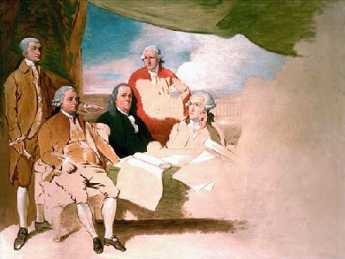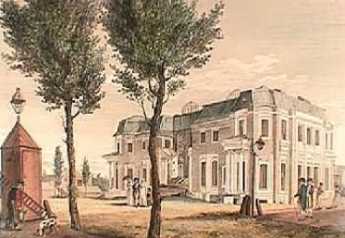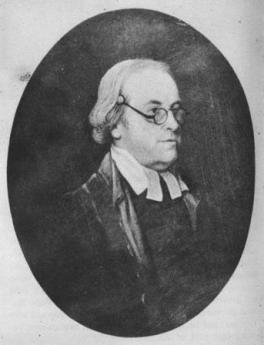Related Topics
Robert Morris: The Dark Side
The richest man in America suddenly was locked in debtor's prison, $12 million in debt. While in prison, he reduced that to $3 million, and got released under a new bankruptcy law he helped devise.
Real Estate Bubble Traps Robert Morris

|
| Treaty of Paris |
When the Treaty of Paris finally ended the eight-year American Revolutionary War, it was approximately true that the ownership of the whole North American continent changed hands. The activities of the war had to be wound down, old debts settled, and the new Industrial Revolution had to be addressed. Deflation was certain as wartime activities were eliminated, but inflation also loomed as a result of new peacetime activities. A whole new government had to be started, a whole new set of rules created. In retrospect, things worked out pretty well, but at the time it seemed like unmanageable catastrophes on all sides. Apparently, Robert Morris decided that the greatest opportunity existed in land speculation, so he concentrated in it as he was winding down many other activities.
His first major land speculation was in a million acres in the Genesee country. He soon tripled the value of this investment; if he had simply retired at that point, he might have retired as one of the richest men in the country. Some personality flaw drove him onward, however, and he soon had acquired four million acres of upstate New York property on which he approximately broke even. He next acquired large tracts of central Pennsylvania along the whole Susquehanna River, offering the Azilium venture to French investors and Northumberland to Joseph Priestley and the Unitarians. Both of these utopian ventures were largely abandoned by the settlers, because of the French reign of terror, and the disaffection of Priestley's English followers. Because he hoped to keep the new National Capital on the Delaware River while struggling with western Pennsylvania interests who wanted to move it to Harrisburg, he invested in thousands of acres of Pennsylvania land around Morrisville, across the river from Trenton. Needless to say, the capital was not moved to Trenton, so after two centuries the land is still sparsely settled.

|
| Morris Folly |
Finally, when sales were sluggish, six million acres from Virginia to Georgia were combined into a gigantic real estate trust in order to make the speculation more appealing to smaller investors in large numbers, which accounts for Talleyrand himself buying 100.000 acres, as well as drawing the participation of John Bull, himself. But by 1797 the world began to know that the real estate bubble was in danger, and many related ventures started to fail. In a complicated set of circumstances, it is hard to know which failure was more important than the others, but the general opinion emerges that Morris' main speculative failure was centered on land speculation. It must be mentioned, however, that in 1793 Philadelphia experienced one of several Yellow Fever epidemics, the French, as well as the English, were seizing American vessels and crews, the Whisky Rebellion took place in western Pennsylvania, and that Morris in what must either have been a public relations stunt or else a moment of temporary madness, began construction of a new home for himself in Philadelphia. Located on an entire block between Chestnut and Walnut at 7th Street, it was to be the most ornate private residence in America, with two levels below ground and two above, decorated with imported marble and endless extravagant fixtures. By itself, this house widely known as "Morris' Folly" could not have bankrupted him, but it may well have stripped him of ready cash when short term debts were more pressing than long ones, starting a cascade of forced distress sales at low prices. Furthermore, as though there needed to be a furthermore, tobacco had been the preferred return cargo in the transatlantic munitions trade. Tobacco does not spoil, so when prices were low, Morris often held it off the market to await higher prices. He thus was engaged in wide-spread zero-sum trading, where either you or your counterparty is likely to be cleaned out. That can make for a large accumulation of enemies, quite willing to destroy credit even further with accusations of unfair dealing. The Lee family was certainly in a position to fan the flames of such commercial antagonisms, both among creditors and in Congress. When all is said and done, to ascribe the bankruptcy of Robert Morris to land speculation is not perfectly accurate, but close enough. Particularly if credence is given to his own reflection that, had he quit after the Genesee transaction he could have lived the rest of his life as the richest man in America, land speculation seems a better psychological explanation for his behavior than many other complicated maneuvers, now too obscure to be worth explaining.

|
| David Hartley |
Debtors prison now seems like a barbaric and cruel treatment of unpaid debts, but at least in Morris's case, it may not have seemed the worst of it. His entire inventory of personal effects on entering debtors prison on February 16, 1798, included three writing desks, an old Windsor setee, and eight old Windsor chairs, six chests stuffed with papers, a mirror, a trunk of clothes, and a bed. However, he had many visitors, including Gouverneur Morris and George Washington. His debts were twelve million dollars, which he reduced while in prison to three million, so this world-class workaholic was probably relatively happy to concentrate on business affairs. His wife Mary undoubtedly suffered far worse humiliation in her small house on 12th Street while he was confined than he did, busy with his bookkeeping. Although she saw a few friends, she essentially withdrew from society until August 21, 1801, when he was released. Morris himself probably experienced his worst suffering from 1793 to the time he finally surrendered to the sheriff in 1798, a period of five years of uncertainty, gloom, dashed hope and offensive behavior by his 90 creditors. There must have been times when he truly believed he might survive the struggle, and other times when he had to keep up a brave front when he knew in his heart he could never make it. Nevertheless, scraping together nine million dollars while behind bars would be a remarkable achievement today, and certainly an amazing one for 1800. America had no bankruptcy laws at the time, and he managed to persuade Congress to create them for the many victims of the severe financial panic. Even for the vindictive, the provision in the law that release from debtors prison was conditional on a favorable petition from his creditors, made it unlikely that he could persuade 90 creditors to do it. But he did so and walked out a free man. Or rather, he walked out a dejected and humiliated has-been, a zombie creeping the streets. Perhaps that was the worst.
His will.
REFERENCES
| The Invention of Air: A Story of Science, Faith, Revolution,and The Birth of America, Steven Johnson ISBN: 978-1-59448-852-8 | Amazon |
Originally published: Friday, May 20, 2011; most-recently modified: Monday, June 03, 2019